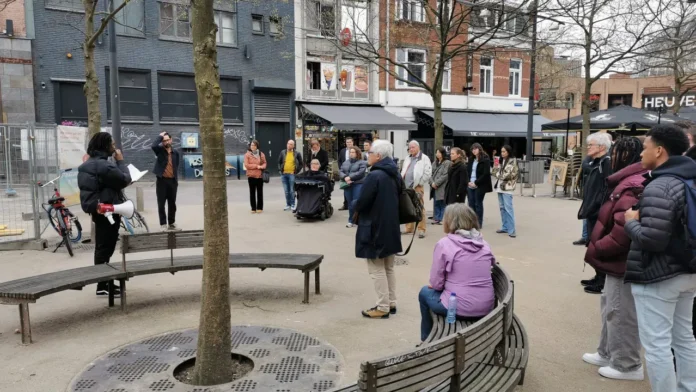Anti-discrimination agency Radar had a city walk through Eindhoven on Thursday 21 March, the International Day against Discrimination. The attention was on discrimination in general, and ethnic profiling in particular.
Some 25 people attended the start of the city walk at café M near the Muziekgebouw. The city walk was organised by Radar. “We are focusing on ethnic profiling today because it still happens continuously,” says La Haije, who herself has a Moluccan and Portuguese background.
“When I cross a border I make sure my wife, who is white, is behind the wheel. Otherwise, we will be picked out and checked,” says La Haije. “I am going on holiday tomorrow and that is why I am going to shave off my beard. Otherwise, I’ll be pulled out at the checkpoint. Then you’ll be delayed by an hour and if you say something about it, it could take even longer.”
From the audience, La Haije gets support. “It’s a familiar story, of the beard,” agrees one man. “I always put on neat clothes when I travel.”
Not solved
Ethnic profiling seems to remain a problem, despite a court case being won last year by former Eindhoven city councillor Mpanzu Bamenga. The court ruled then that the Royal Military Police may no longer remove people from the queue for checks based on skin colour.
According to Amnesty International, this still happens often. On Thursday, it published a report on ethnic profiling in government. “Various government organisations have taken steps to combat ethnic profiling, but these are not mandatory and insufficient to make a real difference. Citizens in the Netherlands are not effectively protected against government discrimination,” Amnesty International revealed.
Walk
The city walk took attendees past the Catharinakerk, where musician and spoken-word artist Obi recited a poem on the same theme (see photo). The walk ended with a visit to the Van Abbe exhibition ‘Hidden Connections’ which examines the museum’s colonial past. The museum was partly founded with the money cigar manufacturer Henri van Abbe earned in the tobacco industry, with tobacco grown in Sumatra. It was a Dutch colony at the time.
Source: Studio040
Translated by: Chaitali Sengupta















